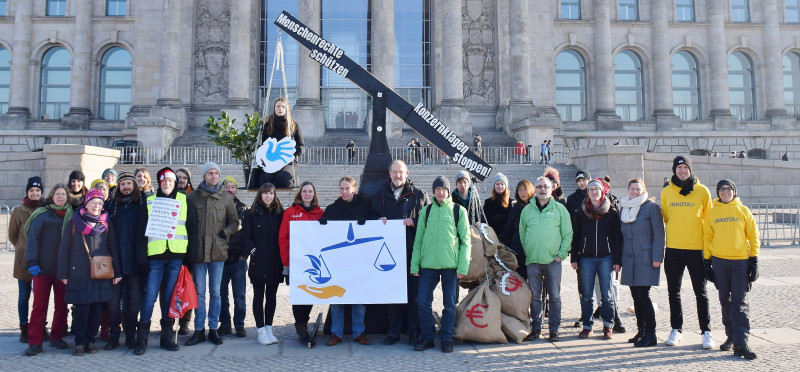An obscure investment treaty, the Energy Charter Treaty (ECT), could undermine the goals of Europe’s Green Deal, unless it is fundamentally revised in negotiations that trail its annual conference this week in Brussels, over 250 civil society organisations and trade unions warn.
European Green Deal undermined
Campaigners are demanding an end to protection of fossil fuels and scrapping of investor rights in the treaty. They warn EU efforts to tackle the climate emergency under the European Green Deal, which is set to be unveiled by EU President von der Leyen on Wednesday (11 December), will be undermined if the treaty is not ‘climate proofed’ – brought in line with the Paris Climate Agreement.
Failure to fundamentally reform the treaty must result in its member states withdrawing from it, the civil society letter published demands.
Paul de Clerck, economic justice coordinator at Friends of the Earth Europe said:
“The Energy Charter Treaty is totally outdated, it’s a boon to dirty fossil fuel companies. As soon as people hear about this obscure pact undermining the public interest and the fight against climate change, they will be outraged. Either the EU and member states fundamentally revise it, or pull out.”
End protection for fossil fuels
260 civil society organisations and trade unions from Europe and worldwide, including Friends of the Earth Europe, Corporate Europe Observatory, the European Public Service Union, and the Transnational Institute, warn that the ECT is incompatible with the Paris Climate Agreement, Just Transition policies, and the expected European Green Deal, because it is used by large fossil and nuclear energy companies to lock-in their investments and challenge national government decisions to phase out dirty energy.
The ECT contains measures to protect energy investments even where they contradict climate goals. And it has an Investor State Dispute Settlement (ISDS) mechanism that allows foreign investors in the energy sector to directly sue governments outside of existing courts, in secretive international tribunals, claiming up to billions in compensation if their (future) profits are affected.
Some examples:
- Vattenfall is claiming €6.1 billion from Germany for its nuclear exit following the Fukushima disaster.
- German company Uniper announced that it would sue the Netherlands and claim compensation if the country approves a law, due to be voted tomorrow in the Hague, to phase out coal power.
Commenting on the Uniper case, Freek Bersch, campaigner for Milieudefensie / Friends of the Earth Netherlands said:
“The Energy Charter Treaty is partly responsible for slowing down the Dutch coal phase out. The law that will be approved tomorrow by the Dutch senate delays the coal exit until 2030, out of fear of high claims like from Uniper.”
Energy treaty ‘risks undermining EU’s green new deal’ https://t.co/dlbVa5UYxn
Calls for ECT to be scrapped to stop fossil fuel firms using it to take governments to court pic.twitter.com/kRqMcN0iy6— Svein T veitdal (@tveitdal) December 9, 2019
Dirty energy lawsuits to challenge energy transition
Campaigners fear a flood of new ECT lawsuits in the future, as countries increasingly develop plans for climate neutrality and a clean energy transition. They also demand a break on expanding the ECT to new countries. The secretariat of the ECT is engaged in strong efforts to expand its membership, especially with African countries.
Modernisation of the ECT, with negotiations beginning this week, are however unlikely to bring the treaty in line with necessary climate policies. Scrapping protection for fossil fuels is not on the agenda, while no ECT member state wants to end VIP rights for investors to challenge government decisions. Moreover, any change will have to be approved unanimously by all member states, many of whom are coal, oil and gas exporters.
Moral outrage
Pia Eberhardt, trade campaigner at Corporate Europe Observatory said:
“That Big Coal might use the Energy Charter Treaty to claim massive payouts for the phase-out of coal in Holland, shows just how terrible this treaty is for the climate. It’s a moral outrage to pay polluters billions just because we stop them from destroying the planet. Now is the time to fix or nix the Energy Charter Treaty.”
Jan Willem Goudriaan, General Secretary of the European Federation of Public Service Unions (EPSU), said:
“The rules for the energy sector need to be rewritten. People and planet have to come before profits. Public investment and ownership can lead the way towards climate justice for our communities and a just transition for all workers concerned. The treaty revision must reflect this.”
Sued for billions for taking #climate action? A coal company wants to sue for phasing out dirty coal power. THIS is how an obscure trade treaty, the #EnergyCharterTreaty is blocking #ClimateAction#NoECT #FossilFree #ISDS #StopISDShttps://t.co/HtwqOgR0Gc pic.twitter.com/kPQckZEspJ
— Friends of the Earth (@foeeurope) December 9, 2019
Related Content
We think you’d also like:

European Green Deal
The European Green Deal has the potential to transform Europe’s economy to help fix the climate and ecological crises, and support workers in the transition. But it is in danger of being too little, too late.

Stop the Energy Charter Treaty
The Energy Charter Treaty (ECT) is a major obstacle to fast and effective action on the climate and environmental crisis. Our transformation to a green and fair society will become harder, slower and more expensive if we don’t stop it.







